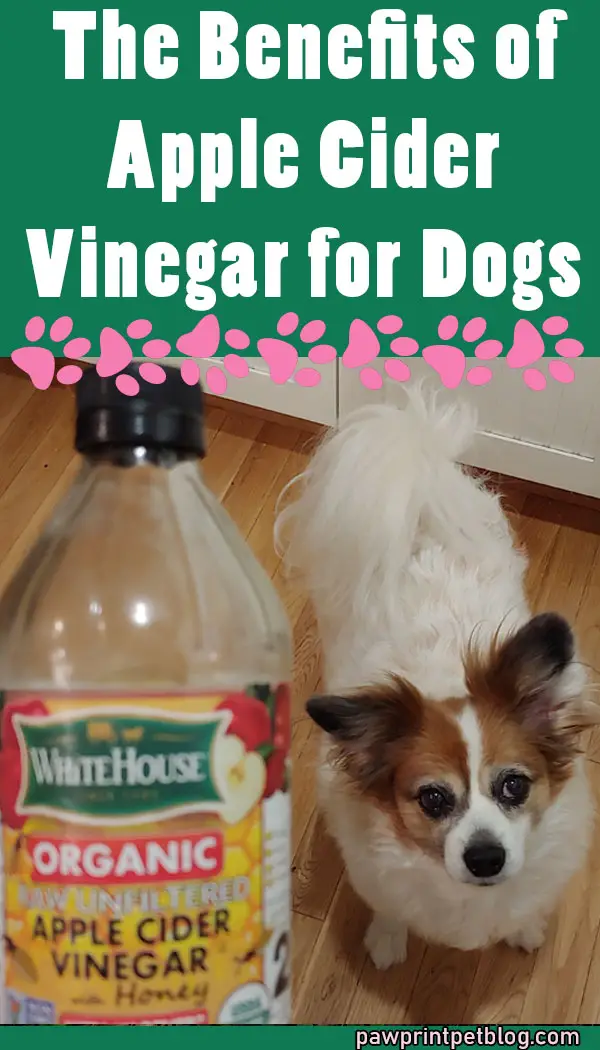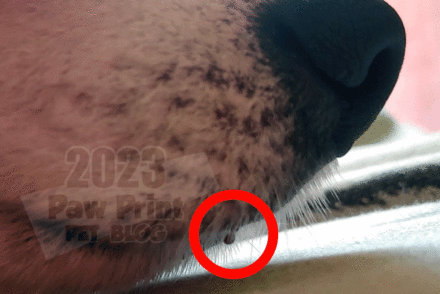sChances are, you have already heard a bit about the benefits of apple cider vinegar (acv) for dogs. No stranger to acv (I use it in my hair), I personally learned about it’s potential benefits for dogs while searching for natural ways to help soothe Kitsune’s itchy skin. Kitsune has both food and environmental allergies, the latter of which used to really irritate his skin. Thankfully, over the years I’ve gotten good at managing Kit’s allergies, so he rarely has a bad flair up these days. Besides allergy relief, apple cider vinegar is said to provide a plethora of health benefits for our furry friends.

So exactly what can apple cider vinegar do for your dog?
- Used topically, acv can condition the fur (and human hair too!), help fight bacterial/fungal skin infections, and soothe the skin.
- It is also said that acv can help to naturally repel biting insects such as fleas and ticks. You can add a few teaspoons of acv into a spray bottle filled with water. Use the spray on your pet before going into areas where contracting fleas/ticks is a concern. Just make sure, when using vinegar topically, to keep it away from your dog’s eyes (it stings)!
- Given as a dietary supplement, acv is said to have many benefits such as helping to relieve arthritis, improving digestion, aiding in bladder and kidney health, re-leaving allergy symptoms, and fighting against fungal/bacterial infections.
- Acv is said to be able to help prevent tooth decay and may improve bad breathe.
- Acv can be used to clean ears, paws, etc., and can help prevent yeast infections.
- Many owners have reported that acv, used as a dietary supplement, has been able to greatly reduce or even eliminate their pet’s tear stains. It’s much healthier than many of the products sold for this purpose.
- I use acv as a nontoxic cleaner to clean up after my pets. It does a great job at eliminating urine odors if your pet has an accident. Acv can be used to clean pet dishes and counter tops rather than using harsh chemicals.
Are all brands of apple cider vinegar created equal?
Not necessarily. How picky I am about what type of vinegar I buy depends on what I’m planning on using it for. If I’m buying acv to rinse my hair, or clean my counter tops, I usually just go for the cheapest bottle of store brand acv. However, if I’m buying it to mix in with Kitsune’s food, I end up buying more expensive brands. Always the best for my furry friend. But there is a reason why I pay more for the higher end acv if I’m planning on using it as a supplement.
If you’re going to add apple cider vinegar to your dog’s food or water, you want to look for acv brands that say they contain ‘mother’. The mother of the acv will usually appear as a cloudy sediment on the bottom of the jar. You may have noticed that this is absent in some brands of acv. It’s a weird sounding term, but the mother is basically a collection of things like good bacteria, enzymes, and proteins. It is widely believed that the mother of the acv is the part that contributes most to its health benefits.
How much apple cider vinegar should I give my dog?
 I mix acv in with Kitsune’s food usually twice per week, sometimes more often if his allergies are bothering him more than usual. I only give him a teaspoon at a time. Kitsune is 20 lbs. Be careful about adding too much acv to your dog’s water or food. It has a strong smell and flavor and may cause your pet to refuse his/her food if too much vinegar is added.
I mix acv in with Kitsune’s food usually twice per week, sometimes more often if his allergies are bothering him more than usual. I only give him a teaspoon at a time. Kitsune is 20 lbs. Be careful about adding too much acv to your dog’s water or food. It has a strong smell and flavor and may cause your pet to refuse his/her food if too much vinegar is added.
Topically, I use a mixture that’s 50% acv and 50% water. As I said before, just be very careful to keep vinegar, even when diluted, away from your pets’ eyes. If your dog has any open wounds, or his skin is raw/inflamed, using acv can sting. Do not insert acv, or anything else for that matter, into your dog’s ears if s/he has an active infection without first consulting your vet.
Apple cider vinegar is a natural supplement that you can feel good about giving your furry friend. However, like with any new food/supplement, always take your individual pet into account. If you have any questions about introducing a new supplement into your pets’ diet, always make sure to do your own research, and talk with your pet’s veterinarian.
Have you ever used apple cider vinegar for your dogs? Have you noticed any improvements to his/her health?






10 Comments
I’d definitely be careful about putting it in ears as well. Often when infections occur skin becomes inflamed and traumatized so it can hurt, and if the eardrum is not intact certain solutions and medication are actually not advised as it can cause hearing loss. I have seen some people use diluted vinegar as a cleaner once a week on dogs’ paws for allergies. Personally, I haven’t used it with my dogs – I usually just wipe down with water once daily to remove allergens instead and it seems to work well for us.
For sure! I actually recommend it more for maintenance ear cleaning vs. when an infection is present. My younger dog, Fenrir, is prone to ear infections and I’ve found that cleaning his ears out once or twice a week with diluted acv on a cotton ball is enough to prevent his ear infections in the first place. In the past, when he’s actually had infections, I make sure to consult our vet before using anything in his ears. That’s awesome if just water works for you! Just plain water doesn’t seem to be enough to help with my Kitsune’s allergies. Full on baths, with dog friendly soap, helps him a lot. Diluted acv spray is easy to apply between baths and helps him a lot more than just water.
I do keep natural apple cider vinegar on hand at all times. I have used it topically for my dogs. When I was home-cooking, I added it to the mix; with the raw, and my dog becoming pickier with time, I don’t think I’d get away with it.
It does have such a strong scent/flavor! I attempted to supplement my own diet with acv before and couldn’t tolerate it, lol. I’m lucky that my Kitsune is so obsessed with food he doesn’t seem to mind the addition of a small amount of acv. I can’t, however, use it as a dietary supplement for Fenrir. He’s super picky – there’s no way I’d ever be able to get him to consume it willingly.
I love all the benefits of ACV. I knew about diluting as ACV is very potent. However, I didn’t realize you could also use in the ears to clean as well as a way to fix bad breath. Who knew?
Right! It has so many potential uses, it’s a great thing to keep around. Even though I don’t use it as often these days as I used too, I always make sure to keep a bottle of it around.
ACV is amazing stuff! The benefits seem to always be expanding with new uses. I haven’t used ACV on my dog simply because he can be a bit sensitive to everything and then turn up his nose and not want to eat at all. I tend to pick my battles with him. However, I do like the idea of adding it in a diluted form for itchy spots. That’s a great idea and would probably be very beneficial for his wanting to lick from allergies. I’ll try that in the Spring. Thanks for that idea!
My girl suffers from a skin condition that is easily triggered by so many different potential causes – food allergies, environmental allergies, etc. We try to avoid chemicals at every opportunity which means that we’re often exploring other natural alternatives. One of the swaps that we have made has been to control the mosquitoes when we’re camping. ACV does a great job of keeping her comfortable and bug-free!
It’s amazing how beneficial apple cider vinegar can be! Thanks for sharing all these uses
Love & biscuits,
Dogs Luv Us and We Luv Them
I had apple cider vinegar recommended for an issue I was having with our senior cat Harvey when he had eczema. A gentle dab with a weak solution (mixed with a couple of other things) was a huge help. It really helped and I think it is one of the mainstays of a lot of holistic care.
Apple cider vinegar is like some of the supplements you buy, it may not seem to have a lot of science behind it but my goodness this stuff works.